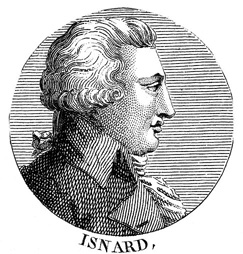| Profile | Major Works | Resources |
Achylle-Nicolas Isnard, 1749-1803

Achylle-Nicolas Isnard was one of the first of a long string of French engineers who dedicated their spare time to economics. Born in Paris, Isnard was a graduate of the École des Ponts et Chaussées and worked as an engineer on roads and canals in the Besançon region.
Isnard was aware of the economic debates of the Enlightenment era and was particularly critical of the Physiocratic doctrine. In his Traité des richesses (published anonymously in 1781), Isnard sought to show arithmetically that industry, and not only agriculture, could produce a produit net. He also showed that the surplus accrues not to landlords as such, but to all owners of scarce factors of production. More originally, Isnard addressed the determination of prices in an exchange economy. He set the problem out mathematically in a multi-good scenario as a system of equations, counting equations and unknowns, determining the numeraire, etc. Isnard's work was highly influential upon Léon Walras.
Isnard's Traité was not well-received at the time - indeed he got upbraided by Jean-Rodolphe Peronnet, the director of the EPC, for not having sought permission to publish it.
At the outset of the 1789 Revolution, Isnard unwisely published a pro-monarchy pamphlet. In spite of this, he was nonetheless appointed chief engineer in Lyons and participated in post-revolutionary politics and administration. From December 1799 to March 1802, Isnard was a member of Napoleon's Tribunat, with special charge of public finances. He died in Lyons in 1803.
|
Major Works of Achylle-Nicolas Isnard
|
|
HET
|
|
Resources on A.N. Isnard
|
All rights reserved, Gonçalo L. Fonseca
